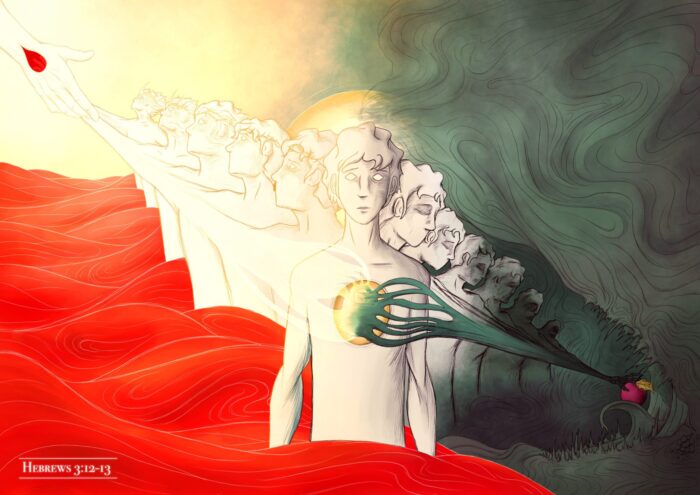
“Take care, brothers, lest there be in any of you an evil, unbelieving heart, leading you to fall away from the living God. But exhort one another every day, as long as it is called ‘today,’ that none of you may be hardened by the deceitfulness of sin.” – Hebrews 3:12-13
The Passage Explained
Verses 12-13 form the heart of Hebrews 3. All that comes before in the chapter forms the logical rationale for the call of 12-13, and all that comes after functions as a ground for that call. Verses 1-6 establish the supremacy of Christ over the Mosaic Law and set Jesus forward as the singular object of Christian faith and, therefore, hope. In verses 7 through 11, the author grounds the necessity of holding fast to the supreme Christ by pointing to Old Testament Israel. The Exodus generation succumbed to unbelief and were therefore cut off from the people of God and failed to enter the promised land. With the necessity of maintaining faith in Christ highlighted by his OT citation, the author now moves to verses 12-13 which form the central portion of the chapter: a call to rigorously guard self and others against unbelief. Having issued this weighty command, the author takes verses 14-19 to offer two more OT examples, further supporting the necessity of intentionally maintaining faith in Christ.
With verses 13-14 established as the center of the chapter, lets briefly look at their content. It seems to me that the author’s command divides into two portions. The first, verse 12, is aimed mainly at the individual and is a call to guard the heart. It’s interesting that there seem to be only two options for the believer:
“Take care, brothers, lest there be in any of you an evil unbelieving heart…”
Either we “take care” or there will be in us a heart of unbelief that will lead us, by gradations, away from the living God. Another option does not seem to present itself. Now, we need to be careful not to read “loss of salvation” into this text. Yes, we can fall away from the living God, but no, we cannot lose our salvation. I say this because verse 14 is clear that “we have come to share in Christ if indeed we hold our original confidence firm to the end.” In other words, those who fall away were never truly in Christ, and all those who are truly in Him never fall away (1 John 2:19).
This, then, leads to the logical question—how do we “take care”? I think we get the answer in the chapter’s first verse, “…consider Jesus the apostle and high priest of our confession.” This is refreshingly counterintuitive. We might assume that guarding our hearts from slipping into unbelief would entail introspective musings and nuanced tests of our faith—but that doesn’t at all seem to be what the author of Hebrews prescribes. Rather, he would call us to “pay much closer attention” to Christ (2:1), to “consider Christ” (3:1), to look “to Jesus, the founder and perfecter of our faith, who for the joy set before Him endured the cross, despising the shame, and is seated at the right hand of the throne of God” (12:2). We strengthen our faith and guard against unbelief, not by turning inward and seeing how strong our belief is, but by turning outward and intentionally seeing and savoring the object of our faith—the risen Son.
This leads into verse 13, the second portion of this central command. In addition to guarding one’s own heart, here the author calls believers to assist in guarding each other’s hearts. The word translated “exhort” has a variety of uses in the NT, and in contexts similar to Hebrews 3:13, it can mean to comfort (2 Corinthians 1:4, 2:7), to encourage (Colossians 2:2; 1 Thessalonians 4:18, 5:11), to appeal (Romans 12:1, 15:30; 2 Corinthians 5:20), or to urge (1 Corinthians 4:16; Ephesians 4:1). However, I think we could summarize the command to “exhort one another” in almost the same way that we summarized the command in verse 12, namely: to help others consider Jesus.
It is not enough to set our own hearts and minds on Christ, we must be seeking—daily according to verse 13—to help others set their hearts and minds on Him as well. We might do this by appealing that someone turn from their sin in light of the gospel, or by encouraging another with the finished work of Christ, or by comforting someone with the invincible hope of the resurrection, or by urging a friend on in their works of Christ-like love. This daily exhortation will take on a variety of forms, but I think its essence will always be the same: “consider Jesus.”
As we guard our own hearts from unbelief by intentionally and increasingly considering the myriad excellencies of Christ, we will grow in our ability to graciously help others stave off the hardening effects of sin’s deceits. This is why, I believe, verse 12 precedes verse 13. And yet, the communal exhortations of verse 13 must be happening if we hope to persevere in the individual heart-guarding of verse 12. And so we see a sort of saint-preserving cycle established in these verses. As the individual believer considers Jesus, their heart is guarded from unbelief so that they can exhort others to consider Him and persevere, but each individual believer’s perseverance is designed to depend upon the external exhortations of other believers. As John Piper has said, “eternal security is a community project.”
The Picture Explained
Since Hebrews 3:12-13 presents two polar options for the believer (take care / exhort or fall away / be hardened), I made that spectrum the central theme of this image. To the man’s left a train of unbelieving, heart-hardening decisions sends him away from God after the pursuit of deceitful and ultimately damning pleasures. With each step along this path, the man becomes more and more callused to the beauty of God in Christ and the dangers of sin…by the end his form is barely recognizable as human. To the man’s right, a steady “considering of Jesus” moves him from “one degree of glory to the next” (2 Corinthians 3:18). The man’s eyes widen with each gradation as he beholds more of God’s glory in the Son and, accordingly, receives a greater capacity for beholding. In addition, notice that he wears a crown of thorns that transitions into a crown of glory as he approaches likeness to—and the presence of—his Lord. This is because taking care to guard our hearts and to pursue Christ will often be the path of difficulty and suffering (as with Christ Himself, Hebrews 12:2)—but our risen Desire will be faithful to turn all of the pain endured as we suffered with Him (Romans 8:17) into glory. The saint travels toward Christ over an ocean of red because every step in the believer’s sanctification—as with their initial justification—is secured by the death and resurrection of Jesus (Hebrews 10:14).
Now, as I mentioned in the previous section, this image is not meant to imply that a believer can “lose their salvation” (Romans 8:28-30; 1 Thessalonians 5:23-24), rather it—like the verses from which it is drawn—is intended to function as a sobering warning and a call to guard against invading sin and pursue the all sufficient Christ. The one who is truly in Christ will read the words of Hebrews 3:12-13 and be reinvigorated to guard their hearts and to exhort others along that same path. My hope is that this picture will serve a similar end, namely, that by representing the very real consequences of our incremental decisions, it will call believers to “take care” that they not give in to unbelief and to “exhort one another every day” to guard against the deceits of sin.
And that leads to my final comment about this picture. Hebrews 3:13 puts a heavy focus on exhorting one another in this journey. So, you might ask, where are the others in this picture? To that I would simply say that you are the other. This picture is my attempt to exhort the viewer to pursue Christ and guard against the deceitful pleasures of sin. Making this picture was an attempt to exhort the viewer, in obedience to Hebrews 3:13. So, as you consider this picture and, perhaps, share it with others, I hope that the command we’ve received in these verses would go on being obeyed and that believer’s would be encouraged to once again “consider Jesus.”




